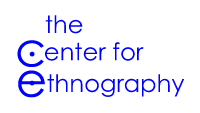
an
interdisciplinary
campus center
RETHINKING ETHNOGRAPHY AS A DESIGN PROCESS
The UCI Center for Ethnography is inaugurating an exploration of the ways that the varied arenas of design thinking, research, and education in art, architecture, urban planning, graphics, informatics, and industry are providing resources and circumstances for changes in the classic form of ethnographic inquiry, evoked by such terms as fieldwork, participant observation, and eliciting data from informants. Over this academic years and the next, we are sponsoring a series of wide-ranging conversations, on the model of the very successful series that the Center continues to produce on particular projects and careers that have depended on conditions of collaboration. The format is lunch-time events, each initiated by a 20-30 minute conversation/interview involving two or, at most, three, interlocutors, and then opening discussion to the room for a remaining hour. The first event is scheduled for Wednesday, October 22, 12-2:30, and will feature a conversation among Paul Dourish, Informatics at UCI, Chris Kelty, Information Theory at UCLA, and George Marcus, Director of the Center for Ethnography.
Design practices, thinking and education as a topic brings together many different fields today and stimulates interdisciplinary exchange. Ethnography is increasingly popular as a mode of inquiry, and its classic practices are being reshaped in the many environments of its contemporary application. The Center's primary interest in taking up the relationship between the two is to try to map dimensions of design practice and education upon the current forms and norms of ethnographic inquiry as a way of addressing certain issues and problems in the latter. Mostly, we are interested in trying to think of ethnographic inquiry as a kind of process of design, and we have mainly pedagogical goals in mind--that is, how design processes might inform the way that students in a number of disciplines are trained to conduct ethnographic inquiry. How is ethnographic inquiry like design processes? and not? How might design practices inform contemporary problems of ethnographic research that involve different kinds of partnerships, collaborations, outcomes, and politics than in its established formulations? At the same time, this specific interest of ethnography in design will better prepare ethnographers to participate in discussions and projects for which design processes themselves are the primary emphasis.



